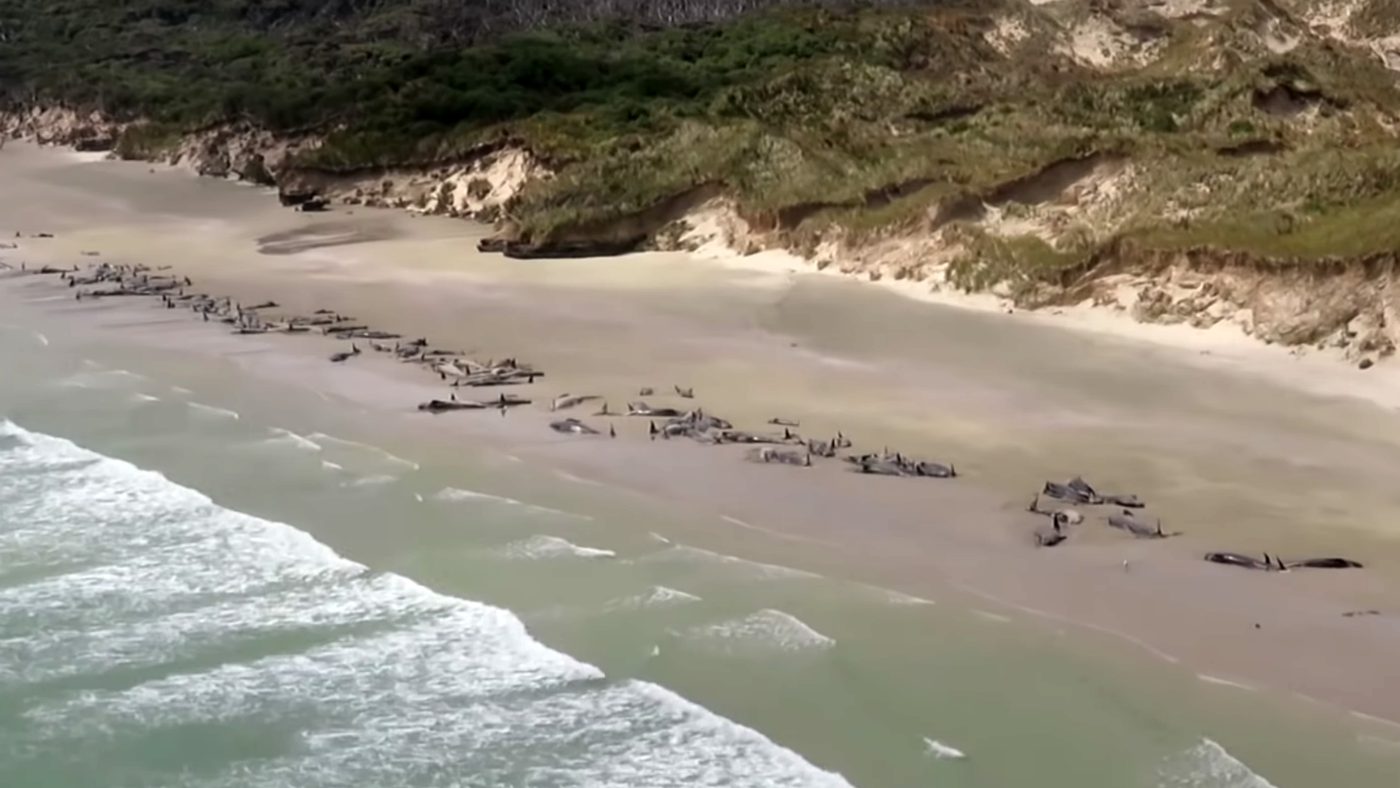New Zealand whale stranding: 145 dead on remote beach
Conservation officials forced to shoot dozens of dying whales

A free daily email with the biggest news stories of the day – and the best features from TheWeek.com
You are now subscribed
Your newsletter sign-up was successful
At least 145 whales have died on a remote beach in New Zealand after becoming stranded on the shore.
The mass stranding of two pilot whale pods occurred on the sparsely populated Stewart Island, off the southern tip of New Zealand’s South Island, over the weekend.
A hiker spotted two groups of beached whales on Saturday evening, lying around a mile apart on the shore of Mason Bay, the New Zealand Herald reports. The bay is located in a remote area, 22 miles from the island’s only settlement.
The Week
Escape your echo chamber. Get the facts behind the news, plus analysis from multiple perspectives.

Sign up for The Week's Free Newsletters
From our morning news briefing to a weekly Good News Newsletter, get the best of The Week delivered directly to your inbox.
From our morning news briefing to a weekly Good News Newsletter, get the best of The Week delivered directly to your inbox.

The walker notified Department of Conservation (DoC) workers, who rushed to the area to find that around half of the whales had already died and the rest were rapidly deteriorating.
Those still alive “were half buried in sand and not in good health, indicating they had been there for perhaps a day before they were found”, the Associated Press reports.
“Sadly, the likelihood of being able to successfully re-float the remaining whales was extremely low,” the island’s DoC operations manager Ren Leppens said.
“The remote location, lack of nearby personnel and the whales’ deteriorating condition meant the most humane thing to do was to euthanise.”
A free daily email with the biggest news stories of the day – and the best features from TheWeek.com
DoC workers shot the remaining whales and said the carcasses would be left where they were for nature to take its course.
“It's always a heart-breaking decision to make,” Leppens said, calling the incident “a really sad event”.
The DoC responds to an average of 85 whale strandings a year on New Zealand’s coastline, the majority involving only one animal.
“Exactly why whales and dolphins strand is not fully known but factors can include sickness, navigational error, geographical features, a rapidly falling tide, being chased by a predator, or extreme weather,” the department said in its report of the incident.
-
 Magazine solutions - February 27, 2026
Magazine solutions - February 27, 2026Puzzle and Quizzes Magazine solutions - February 27, 2026
-
 Magazine printables - February 27, 2026
Magazine printables - February 27, 2026Puzzle and Quizzes Magazine printables - February 27, 2026
-
 ‘The forces he united still shape the Democratic Party’
‘The forces he united still shape the Democratic Party’Instant Opinion Opinion, comment and editorials of the day
-
 Epstein files topple law CEO, roil UK government
Epstein files topple law CEO, roil UK governmentSpeed Read Peter Mandelson, Britain’s former ambassador to the US, is caught up in the scandal
-
 Iran and US prepare to meet after skirmishes
Iran and US prepare to meet after skirmishesSpeed Read The incident comes amid heightened tensions in the Middle East
-
 Israel retrieves final hostage’s body from Gaza
Israel retrieves final hostage’s body from GazaSpeed Read The 24-year-old police officer was killed during the initial Hamas attack
-
 China’s Xi targets top general in growing purge
China’s Xi targets top general in growing purgeSpeed Read Zhang Youxia is being investigated over ‘grave violations’ of the law
-
 Panama and Canada are negotiating over a crucial copper mine
Panama and Canada are negotiating over a crucial copper mineIn the Spotlight Panama is set to make a final decision on the mine this summer
-
 Why Greenland’s natural resources are nearly impossible to mine
Why Greenland’s natural resources are nearly impossible to mineThe Explainer The country’s natural landscape makes the task extremely difficult
-
 Iran cuts internet as protests escalate
Iran cuts internet as protests escalateSpeed Reada Government buildings across the country have been set on fire
-
 US nabs ‘shadow’ tanker claimed by Russia
US nabs ‘shadow’ tanker claimed by RussiaSpeed Read The ship was one of two vessels seized by the US military